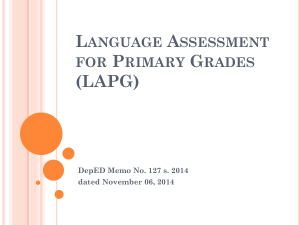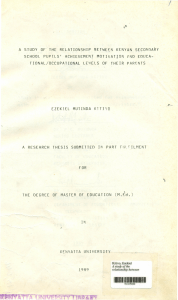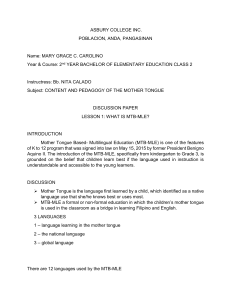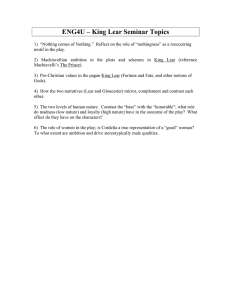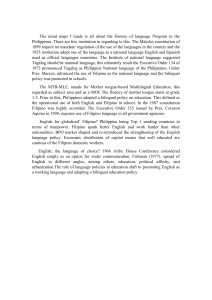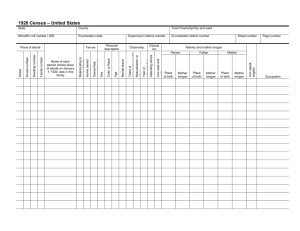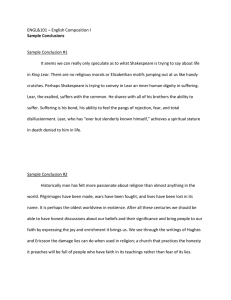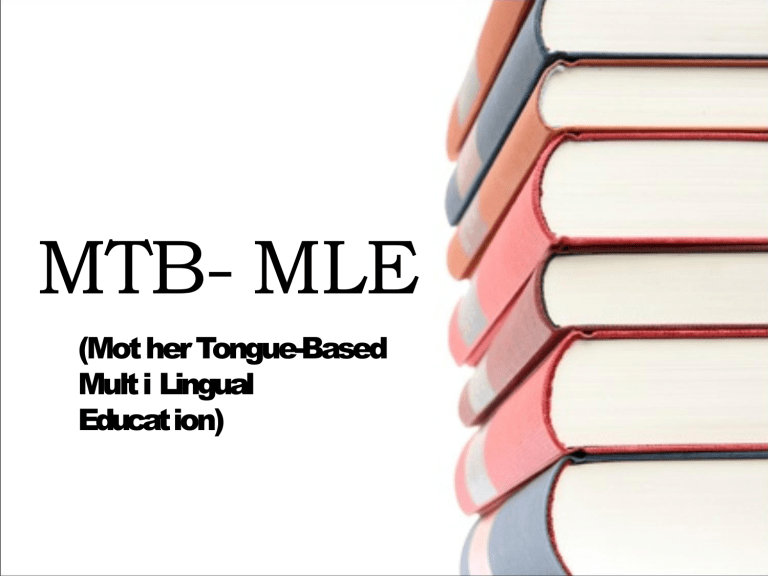
MTB- MLE (Mot her Tongue-Based Mult i Lingual Education) MTB- MLE (Mot her Tongue-Based Mult i Lingual Education) The Philippines is an ar chipelago in the Pacif ic with r ich linguist ic and cult ural diver sity. Accor ding to the Et hnologue, ther e ar e 171 living dialect sspoken in the Philippines today. Making English and Filipino the of f icial languages of the Philippines is a pr actical move, seeing as ther e needs to be language that can be used to do business and tr ade as well as to communicat e on bot h national and int er national levels. The linguist ic discr iminat ionis pr esent in the educat ional syst em in par ticular. bot h psychologically and culturally damaging On t he psychological level, a child’s sense of ident it y is gr ounded in his or her mot her tongue. I f childr en are condit ioned to pair English wit h success, t hey will incr easingly view their own native language as ir r elevant . They may not see t he need t o pass it on to the next gener ation, causing event ual language endanger mentf or minor it y languages,a signif icantcultural loss. Ther e ar e twomajor components of the bill that dr amatically change the f or mat of Philippine schools, st ar ting in 2012. 1 ext ension of secondar y school(K- 12) The Philippines adopt ed a K-12 cycle to ensur e that st udent s ar e pr epar ed to go to univer sit y by the timeof gr aduat ion f r omgr ade12. 2 addr esses the linguist ic discr iminat ion that occur sin emphasizing English educat ion, by implement ing Mot her Tongue Based, Mult ilingual Educat ion (MTB-MLE) This model pr omotes language of inst r uction in the mother tongue of the scho l dist r ict , r ather than Filipino or English. However , these other languages will be taught and incor por ated int o the cur r iculum gradually. Advocat es of t his appr oach point t o pilot pr ogr amsin the Philippines that havebeen successf ulinhelping st udent s gain f ull pr of iciency in the mother tongue, the national language Filipino, and the global language, English. Mother Tongue –Based Multilingual Education (MTB-MLE) is the gover nment’s banner pr ogram f education as a salient part of the or implementation of the Kto 12Basic Educat ion Pr ogr am. I t s signif icance is under scor ed by t he passing of Republic Act 10533, ot her wise known as t he “EnhancedBasicEducation Actof 2013.” Eight (8) major languages or Lingua Fr ancaand other s as cit ed below shall be of f er ed as a lear ning ar ea and utilized as language of inst r uction f or SY 2012-2013: (DO 16, s. 2012 - Guidelines on the I mplement ation of the Mot her Tongue-Based- Mult ilingual Educat ion ) a. Tagalog; b. Kapampangan; c. Pangasinense; d. I loko; e. Bikol; f . Cebuano; g. Hiligaynon; h. Waray; i. Tausug; j . Maguindanaoan; k. Mar anao; and l. Chabacano 7 dialect s r ecent ly added by the DepEd: I banag (Tugegar ao Cit y, Cagayan and I sabela) I vat an (Bat anes group) Sambal (Zambales) Aklanon (Aklan, Capiz) Kinar ay-a (Capiz, Aklan) Yakan (Aut onomousRegion of Muslim Mindanao) Sur igaonon (Surigao) MTB-MLE is educat ion, f or malor non -f or mal, in which the lear ner ’s mother tongue and addit ional languages ar e used in the classroom. This br idge enables the lear ner s to use bot h or all their languages f or success in school and f or lif elong learning. Wit h t he end goal of making Filipino childr en lif elong lear ners in their L1 (MT), L2 (Filipino, t he national language), and L3 (English, the global language) t he lear ner s ar e mor e t hat pr epar ed t o develop t he compet encies in t he dif f er ent lear ning ar eas. MTB-MLE provides: Lit eracy .Prior knowledge. Cognit ive development and HOTS. St r ong Bridge. Scaf f olding. Teaching f or meaning and accuracy Conf idence building and pr of iciencydevelopment LI TERACY PRIOR KNOWLEDGE Cognitive development and higher order thinking skils Strong Bridge Scaf f olding Teaching f or meaning and accuracy Conf idence building and prof iciency development “Weshouldbecometri-lingualasacountry. LearnEnglishweland connecttotheWorld. LearnFilipinowelandconnecttoourcountry. Retainyourdialectandconnecttoyourheritage.” -BenignoAquino I II
